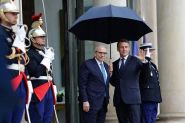On the occasion of Lebanese Army Day, President Joseph Aoun delivered on Thursday a speech of rare resolve, calling for a national awakening around the military institution and demanding that all weapons – without exception – be placed under the exclusive authority of the Lebanese Army. In an address clearly directed at all Lebanese, including Hezbollah, the president warned: “This is the moment of truth. We either choose the State, or face collapse.”
“We are tired of fighting others’ wars on our soil, of reckless bets and deadly adventures. It is time to put an end to the ambitions of our enemies,” Aoun declared, in a clear reference to the escalating tensions between Israel and Hezbollah in southern Lebanon. Rejecting all political one-upmanship and provocation, he urged unity behind the Lebanese Army, describing it as the sole guarantor of national sovereignty.
A Direct Appeal to Hezbollah's Base
In a particularly pointed moment, the president addressed those “who have resisted aggression” – an implicit reference to Hezbollah and its supporters – stating: “I call on you to place your trust solely in the State. Otherwise, your sacrifices will be in vain, and the State will collapse.” The message was a firm but open-handed call: only a unified army, acting in the name of all Lebanese, can sustainably safeguard national security.
Toward a Total Monopoly on Armed Force
“My insistence on exclusive military authority for the army stems from a desire to defend Lebanon’s sovereignty, liberate occupied territory, and build a State that belongs to all its citizens,” Aoun said. He stressed that weapons can no longer remain in the hands of factions or armed groups, whatever their identity.
Strengthening and Supporting the Army
The president announced that the army will soon welcome 4,500 new recruits, boosting its capacity to defend the country. He also highlighted the importance of allocating $1 billion, secured from international donors, to improve soldiers’ living conditions, modernize equipment, and restore confidence in an institution long overlooked.
Toward a Comprehensive Ceasefire and State Authority
On the diplomatic front, Aoun revealed that talks were underway with the U.S. side, in coordination with Parliament Speaker Nabih Berri and Prime Minister Nawaf Salam, to reach a cessation of hostilities. “The American side presented a draft proposal, to which we made substantial amendments. It will soon be submitted to the Council of Ministers,” he said.
The proposal includes an immediate halt to Israeli attacks by land, sea, and air; an end to targeted assassinations; Israeli withdrawal; the return of prisoners; and the extension of full State authority over all Lebanese territory, including the disarmament of all armed forces, Hezbollah among them. It also addresses the Syrian refugee crisis, the fight against smuggling and drug trafficking, and support for agriculture and alternative industries.
Judicial Reform and the Fight Against Corruption
The president also underscored judicial reform as a cornerstone of State rebuilding. “Prime Minister Nawaf Salam’s government has prioritized restoring public confidence in justice - and justice itself,” he said. A new, integrity-based Higher Judicial Council has been formed, and a new judicial inspection body is in place. “I will sign the decree on judicial appointments as soon as it is ready,” he added.
Addressing the sensitive issue of depositors’ rights, Aoun acknowledged it as one of the most difficult challenges. Several bills have been submitted to Parliament, including those lifting banking secrecy and restructuring the financial sector. The government is also working on legislation to identify the fiscal deficit, finalize IMF negotiations, and restart the economy.
“We are beginning to see a clear shift in the course of justice, starting with the reopening of the Beirut port blast investigation. Taboos are falling, immunities are being lifted, and those involved are being prosecuted and imprisoned, protected only by the law,” the president said, describing it as “the beginning of a long road toward accountability, which only the judiciary can guarantee.”
Finally, Aoun called for a restructuring of the public administration, including diplomatic and administrative appointments. “The judiciary must have full freedom to fight corruption, ensure accountability, defend rights, and uphold equality before the law. This is a steady and upward path that requires trust in justice, and liberation from political interference,” he concluded.



Comments